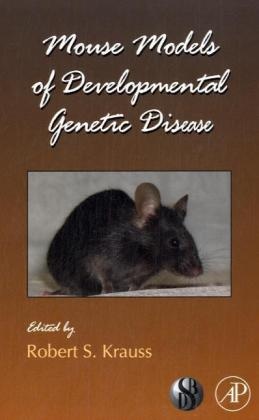Read more
Informationen zum Autor Robert S. Krauss is Mount Sinai Chair in Cell Biology; Professor of Cell, Developmental, and Regenerative Biology at the Icahn School of Medicine at Mount Sinai; and a member of The Black Family Stem Cell Institute and Mindich Child Health and Development Institute. His work focuses on the mechanisms of early embryonic development and adult tissue regeneration. His laboratory uses a wide combination of approaches to gain insight into how genes and the environment interact in the causation of common birth defects, and how adult stem cells are called into action to repair injury to tissues. His lab has constructed accurate animal models for holoprosencephaly, a common and often devastating birth defect, leading to identification of genetic and environmental risk factors. In other work, his lab has identified factors critical to regulation of adult stem cells and muscle regeneration. Klappentext Like humans, mice naturally develop diseases that affect their immune, endocrine, nervous, cardiovascular, skeletal, and other physiological systems. As such mouse has become the premier mammalian model system for studying such diseases as cancer, atherosclerosis, hypertension, diabetes, osteoporosis, and glaucoma; moreover, certain diseases that occur in humans but not normally in mouse-CF, ALS, Huntingdon's disease, for example-can be induced by manipulating the mouse genome and environment. This volume reviews current research findings and thought on mouse models for such human diseases as diabetes, cancer, Alzheimer's, coronary disease, and hypertension, to name a few. Zusammenfassung Mouse has become the premier mammalian model system for studying such diseases as cancer! atherosclerosis! hypertension! diabetes! osteoporosis! and glaucoma. This title reviews the research findings and thought on mouse models for such human diseases as diabetes! cancer! Alzheimer's! coronary disease! and hypertension. Inhaltsverzeichnis 1) Comprehensive Phenotyping of Genetically Modified Mice to Identify New Target Disease Indications Author: Sandra Engle 2) Modeling the Repair Process in Multiple Sclerosis Author: H. Arnett 3) Mouse Genetic Models for Individualized Symptomatology of Cancer and Infectious Disease Author: P. Demant 4) New Rodent Models for Obesity, Diabetes, and Metabolic Syndrome Author: R. Peterson 5) Mouse Models of Huntingdon's Disease Author: L. Menalled, M. Chesselet 6) Mouse Models for Ocular Disease Author: L. Molday 7) Hyperlipidemia-Induced Atherosclerosis Author: A. Daugherty 8) Mouse Models for Mitochondrial Disease Authors: D. Wallace...
List of contents
1) Comprehensive Phenotyping of Genetically Modified Mice to Identify New Target Disease Indications
Author: Sandra Engle
2) Modeling the Repair Process in Multiple Sclerosis
Author: H. Arnett
3) Mouse Genetic Models for Individualized Symptomatology of Cancer and Infectious Disease
Author: P. Demant
4) New Rodent Models for Obesity, Diabetes, and Metabolic Syndrome
Author: R. Peterson
5) Mouse Models of Huntingdon's Disease
Author: L. Menalled, M. Chesselet
6) Mouse Models for Ocular Disease
Author: L. Molday
7) Hyperlipidemia-Induced Atherosclerosis
Author: A. Daugherty
8) Mouse Models for Mitochondrial Disease
Authors: D. Wallace

